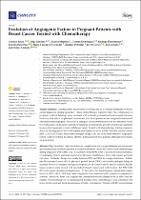| dc.contributor | Vall d'Hebron Barcelona Hospital Campus |
| dc.contributor.author | Sanchez García, Olga |
| dc.contributor.author | Martínez, Sandra |
| dc.contributor.author | Dominguez Luengo, Mari Carmen |
| dc.contributor.author | Ruiz-Pace, Fiorella |
| dc.contributor.author | Céspedes Domínguez, María Concepción |
| dc.contributor.author | Peñuelas Saiz, Angeles |
| dc.contributor.author | Cortés Castan, Javier |
| dc.contributor.author | Saura Manich, Cristina |
| dc.contributor.author | Dienstmann, Rodrigo |
| dc.date.accessioned | 2021-05-27T08:35:17Z |
| dc.date.available | 2021-05-27T08:35:17Z |
| dc.date.issued | 2021-02-23 |
| dc.identifier.citation | Saura C, Sánchez O, Martínez S, Domínguez C, Dienstmann R, Ruíz-Pace F, et al. Evolution of Angiogenic Factors in Pregnant Patients with Breast Cancer Treated with Chemotherapy. Cancers. 2021 Feb 23;13(4):923. |
| dc.identifier.issn | 2072-6694 |
| dc.identifier.uri | https://hdl.handle.net/11351/5984 |
| dc.description | Factors angiogènics; Quimioteràpia; Embaràs |
| dc.description.sponsorship | This study was funded by the Spanish Research Project in Health funded by ISCIII, the state plan for scientific and technical research and innovation 2015–2018, and European Regional Development Fund (ERDF), ref. PI15/02252. This study was also supported in part by RETICS ‘Maternal and Child Health and Development Network’ (SAMID Network), funded by the PN I + D + i 2008–2016 (Spain), ISCIII-Sub-Directorate General for Research Assessment and Promotion, and the European Regional Development Fund (ERDF), ref. RD12/0026 and RD16/0022. O.S. was supported by SAMID Network (RD12/0026/0016 and RD16/0022/0015) and S.M. was supported by “Paseico de la mama”. |
| dc.language.iso | eng |
| dc.publisher | MDPI |
| dc.relation.ispartofseries | Cancers;13(4) |
| dc.rights | Attribution 4.0 International |
| dc.rights.uri | http://creativecommons.org/licenses/by/4.0/ |
| dc.source | Scientia |
| dc.subject | Càncer en l'embaràs |
| dc.subject | Medicaments - Efectes secundaris |
| dc.subject.mesh | Pregnancy Complications, Neoplastic |
| dc.subject.mesh | Placenta Growth Factor |
| dc.subject.mesh | /drug effects |
| dc.title | Evolution of Angiogenic Factors in Pregnant Patients with Breast Cancer Treated with Chemotherapy |
| dc.type | info:eu-repo/semantics/article |
| dc.identifier.doi | 10.3390/cancers13040923 |
| dc.subject.decs | complicaciones neoplásicas del embarazo |
| dc.subject.decs | factor de crecimiento placentario |
| dc.subject.decs | /efectos de los fármacos |
| dc.relation.publishversion | https://www.mdpi.com/2072-6694/13/4/923 |
| dc.type.version | info:eu-repo/semantics/publishedVersion |
| dc.audience | Professionals |
| dc.contributor.organismes | Institut Català de la Salut |
| dc.contributor.authoraffiliation | [Saura C, Peñuelas Á] Servei d’Oncologia Mèdica, Vall d’Hebron Hospital Universitari, Barcelona, Spain. Vall d’Hebron Institute of Oncology (VHIO), Barcelona, Spain. [Sánchez O] Maternal and Child Health and Development Network (SAMID), RD12/0026/16 and RD16/0022/0015, Institute of Health Carlos III, 28029 Madrid, Spain. Biochemistry and Molecular Biology Research Centre for Nanomedicine, Vall d’Hebron Institut de Recerca (VHIR), Barcelona, Spain. [Martínez S] Vall d’Hebron Institute of Oncology (VHIO), Barcelona, Spain. [Domínguez C] Biochemistry and Molecular Biology Research Centre for Nanomedicine, Vall d’Hebron Institut de Recerca (VHIR), Barcelona, Spain. Center for Biomedical Research on Rare Diseases (CIBERER), 08028 Barcelona, Spain. [Dienstmann R, Ruíz-Pace F] Oncology Data Science (ODysSey), Vall d’Hebron Institute of Oncology (VHIO), Barcelona, Spain. [Céspedes MC] Servei de Pediatria, Vall d’Hebron Hospital Universitari, Barcelona, Spain. [Cortés J] Vall d’Hebron Institute of Oncology (VHIO), Barcelona, Spain. International Breast Cancer Center, Quiron Group, Barcelona, Spain |
| dc.identifier.pmid | 33672114 |
| dc.identifier.wos | 000623384400001 |
| dc.relation.projectid | info:eu-repo/grantAgreement/ES/PE2013-2016/PI15%2F02252 |
| dc.relation.projectid | info:eu-repo/grantAgreement/ES/1PN/2008-2011/RD12%2F0026%2F0016 |
| dc.relation.projectid | info:eu-repo/grantAgreement/ES/PE2013-2016/RD16%2F0022%2F0015 |
| dc.rights.accessrights | info:eu-repo/semantics/openAccess |

 Àrea privada
Àrea privada Contacte
Contacte







